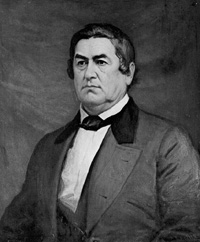 Image via Wikipedia Image via Wikipedia |
| Gen. Ben McCulloch |
- After Federal forces under Gen. Nathaniel Lyon have chased the pro-secession Missouri State Guard, its commander, Gen. Sterling Price, and its duly elected Governor Claiborne Fox Jackson, out of the state capital at Jefferson City and nearly out of the state. At last, at Wilson’s Creek near Springfield, reinforced by Confederate General Benjamin McCulloch’s Western Army composed of Arkansans and Cherokees, they had made a stand, and now Lyon is dead and the Federals in retreat. Gen. Ben McCulloch, today gives Missouri citizens an ultimatum: it is time to take sides. Unlike Lyon and the Federals, McCulloch promises protection to Union sympathizers, but “Missouri must be allowed to choose her own destiny.”/1861
- At Washington, by proclamation, President Lincoln appoints the "last Thursday in September next, as a day of humiliation, prayer and fasting for all the people of the nation." In a recess appointment, Lincoln reappoints William S. Wood, who had charge of the special train that brought Lincoln to Washington for his inauguration, as commissioner of public buildings, as the Senate failed to act on his appointment before adjourning. /1861
- US Navy Commander J. Rodgers arrives with gunboats USS Tyler, Lexington, and Conestoga, at Cairo, Illinois, to protect the junction of the Ohio and Mississippi Rivers and to guard against Confederate movements./1861














